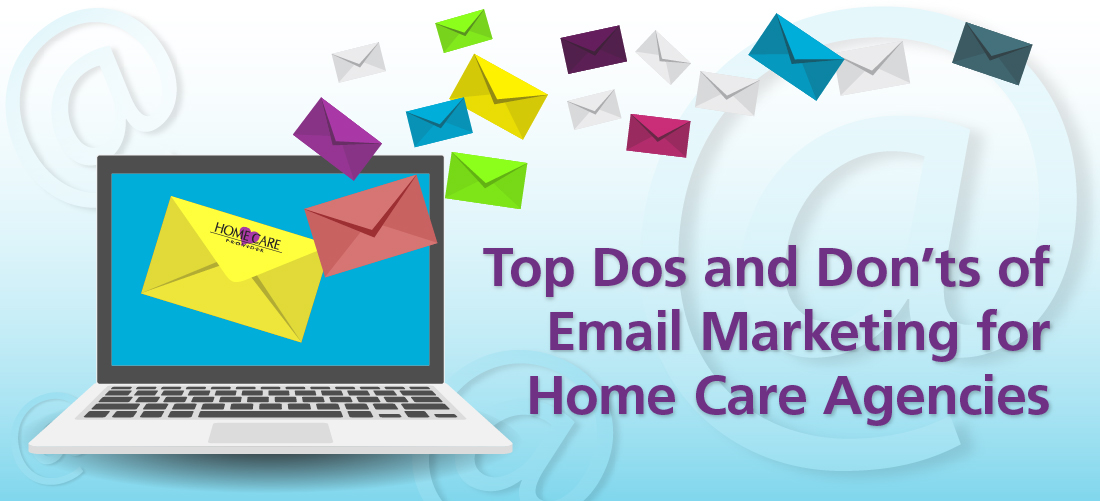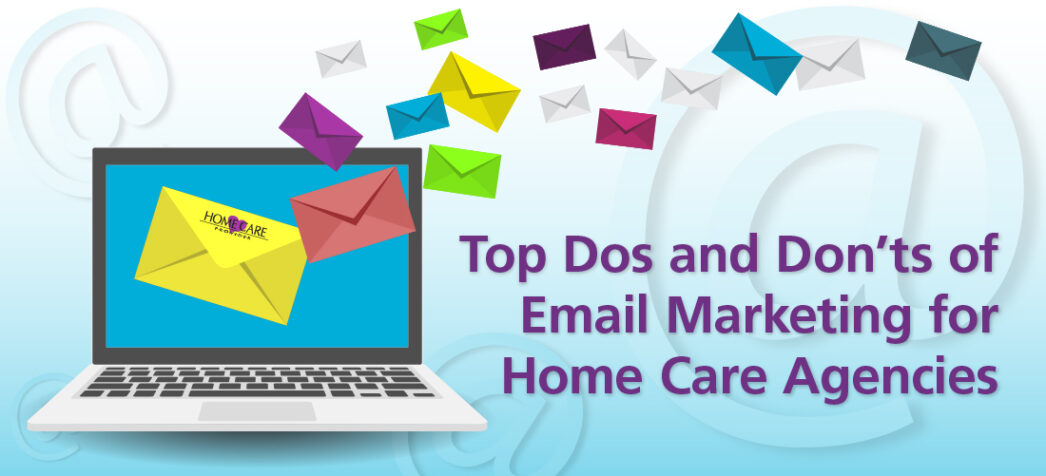
With fewer opportunities to connect face-to-face because of the pandemic, it’s crucial for home care agencies to put their best digital foot forward in marketing to seniors and their family members. If you’re wondering how to do elder care marketing online, be sure not to overlook a fundamental digital marketing strategy that plays a crucial role in your agency’s ability to nurture and convert prospects into clients: home care email marketing.
In fact, email remains the most effective way to reach and connect with baby boomers, Generation X, and millennials. What’s more, over 90% of consumers use email and check their inboxes an average of five times per day. Because of the continued power of email, it is a vital tool for marketing your home care agency. Your email communications can either position your agency as a professional home care provider or cause recipients to choose the competition.
To ensure your home care email marketing is working overtime for your agency, follow these top five best practices:
1. DO: Set up a professional company email address for each person at your agency who has a company email. To do this, sign up for a business/web domain email so that the name of your company appears in the email address. The ideal set-up is: firstname.lastname@company.com.
DON’T: Create and use a default email address domain such as: HarmonyHomeCare@yahoo.com.
To build trust and credibility with consumers and referral sources, professionalism is vitally important. If the email addresses at your agency don’t include the company name, it can appear that your business is not legitimate or trustworthy. When consumers and referral sources are making decisions about care for seniors, they want to partner with an agency that is accountable, established and professional. Vague email addresses can hurt your business by giving the impression that your agency is unprofessional.
2. DO: Create a standard email signature. Everyone who has a company email should be using an approved and branded company email signature block. A professional company email signature should include:
- First name, last name, job title, and any credentials the person has earned, such as RN, MBA, etc.
- Contact information, including the company address as well as the company representative’s email address and phone number(s).
- Company logo and website address, which should be hyperlinked to your website.
- A small, professional headshot. Now more than ever, when we can’t see each other face-to-face as much as we used to be able to do, a headshot humanizes digital communication.
- Also consider including:
- Your business tagline.
- Any accreditations and/or awards your company has achieved. This is an effective way to remind people that your agency has been recognized for high standards in care, customer service, etc.
- Review links to Caring.com, Home Care Pulse, Google, Yelp, etc. This is a subtle but effective opportunity to ask those who already know and respect your agency to quickly and easily share their experience with others.
DON’T: Let staff members create their own email signatures that differ from the standard company signature block. This can look unprofessional and undercut the trust you are working to build with consumers. Avoid using the following in email signatures:
- Cursive or script font choices, which are very difficult to read and look unprofessional in an email
- Multiple color fonts
- Videos or gifs
- Personal quotes – stick to the professional company tagline
Ensuring professionalism in all interactions is critical in building the reputation of your agency. A standard, branded email signature block for each staff member not only provides important contact information, but it also helps consumers and referral sources feel confident in partnering with your agency.
3. DO: Ask for an email address from each person who calls inquiring about services. While some inquiry calls may convert to an in-home consultation on a first call, more often than not, consumers are gathering information from a number of agencies to make a decision. To stand out from the crowd and provide potential clients with useful follow-up, be sure and ask for the person’s email address. To ask for an email address, try these suggestions:
- “I’d like to email you our brochure when we get off the phone. May I have your email address?”
- If the caller has a loved one with Alzheimer’s (or other health condition), you might say “I’d love to send you a few resources on Alzheimer’s caregiving. Why don’t you give me your email address, and I’ll send them over to you?”
DON’T: Forget about or just plain skip asking the caller for key information needed for follow-up:
- Phone number
- Caller’s full name and whom they are calling for
- Any other details that might help you customize your follow-up email
Personalized email follow-up is vitally important after speaking with a prospect. While you may have a standard “form email” that covers information that nearly all prospects want to know, it’s important for the recipient of the email to feel that you clearly understand his or her situation. Always address the person by first name in the email, take the time to recap some of the details of the care situation that was discussed on the phone, and remember to include any follow-up materials that were discussed on the call. These details show that you listened and that you connected with the prospect.
Lastly, be sure to include clear information on what the next steps are to arrange care. Make it as easy as possible for the consumer or referral source to get back in touch with your agency and to get care started.
For inquiry training by a sales professional, consider having your team take this affordable online inquiry training session that will help sharpen the sales process.
4. DO: Standardize the inquiry follow-up process. Establishing a standardized communication/follow-up process is vitally important. Not only will this ensure that each prospect receives the same amount of outreach and nurturing, but it also enables agencies to track conversions and assess opportunities to improve the process. To standardize the inquiry process, we recommend:
- Outlining a written process and training your team on how inquiries are handled initially and the process for follow-up.
- After the first contact the inquiry makes, send an email thanking the caller for his or her inquiry and provide additional information about the agency. This might be a PDF of the agency brochure or a URL pointing the caller toward the page of the website that contains the information most pertinent to him/her.
- A week after the initial inquiry, send another email to check in on the prospect’s process of acquiring information about potential care agencies and to ask if he or she has any further questions about your agency.
- Calling the prospect at two weeks and three weeks, and send a follow-up email if unable to reach the prospect by phone. Then, follow up monthly by email for six months before moving the client into a nurture campaign.
DON’T: Overlook the opportunity to document in your agency CRM each call that comes in and each email that is sent to those who have inquired about your services. All follow-up communications, whether email or phone call, should be documented.
The purpose of collecting good, detailed information during the first inquiry call is to provide personalized follow-up when communicating with that inquirer again. This allows you to remember things like:
- Who the inquirer was calling about: a parent, an aunt or uncle, a spouse, a neighbor, etc.
- What issues the person in need of care is facing: help managing a chronic condition, an upcoming hospital stay, etc.
- What is most important to the inquirer and the person in need of care. Perhaps it was mentioned that attending church on Sundays is important or that he or she is having trouble remembering to take medications.
A standardized follow-up process is a great opportunity to demonstrate to prospects that they are important and that you remember the details about their particular situation. Effective follow-up that includes useful resources shows that your agency is an expert and is prepared to provide a customized care solution.
5. DO: Create at least one type of nurture campaign to keep your agency top-of-mind for cold leads. While not meant to replace 1-1 communication following an inquiry call, a nurture campaign is a series of emails, each covering a different topic, that provides periodic and useful information for prospects. A few examples include:
- Get to Know Us campaign. Designed to help prospects get to know your agency better, these emails can provide key information about your agency as well as light, educational content to build awareness and keep them interested.
- Top of Mind campaign. Engage with your not-quite-ready-to-buy leads at regular intervals, preventing them from forgetting about your company and getting swooped up by your competitors.
- Educational campaigns. When people begin their search for home care services, they often need to be educated about their options. Design a nurture campaign to provide prospects with educational information relevant to their interests, while reinforcing your agency as the expert they need. Educational campaigns can also be designed around a specific health condition, such as Alzheimer’s disease, allowing you to showcase your expertise in specialized care.
- Reengagement campaigns. Designed to target leads that have not turned into sales, these emails are meant to entice prospects to reenter the sales process with a helpful blog post, a new tip sheet, interactive content, or a successful case study to nurture these leads back into your funnel.
DON’T: Create a nurture campaign that emails people the same information over and over again. Content matters. If you don’t have good content, you will cause people to unsubscribe from your company altogether. Remember, content should be:
- Relevant, useful, helpful, informational or educational
- Interesting and well-written
- Concise and not too long
To create effective elder care marketing campaigns, it’s important that the emails look professional and reflect the culture of your agency. Create a header and footer design that is consistent and incorporates key information about your company, similar to an email signature. Email blast services like Constant Contact, MailChimp, etc. give you templates for creating header and footer designs, and also allow you to build distribution lists, segmenting groups of people (clients, referral partners, employees, etc.) that can be targeted for specific nurture campaigns or other communication.
If you are interested in learning more about how to market to seniors online using the power of email, reach out to the professionals at corecubed. Our experienced staff can design your company email signature, create a nurture campaign that is packed with useful information, provide customized sales training to sharpen your inquiry management and sales processes, and a variety of other services that will help your agency get results from elder care marketing efforts. Contact us today at 800.370.6580, x1 to learn more.

